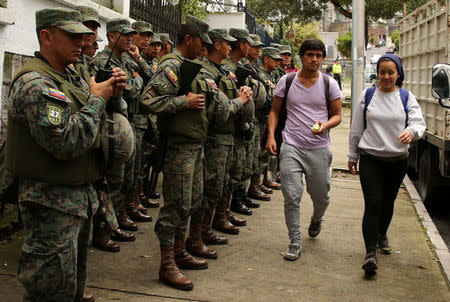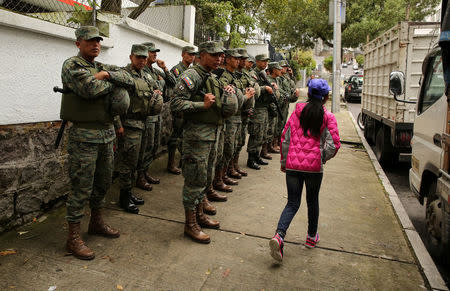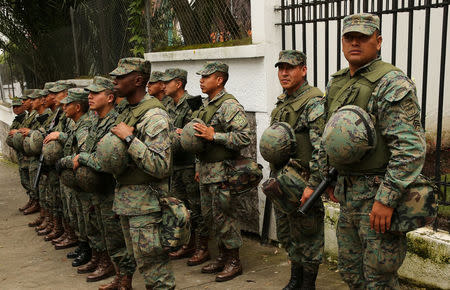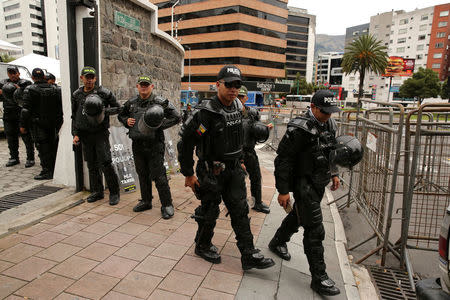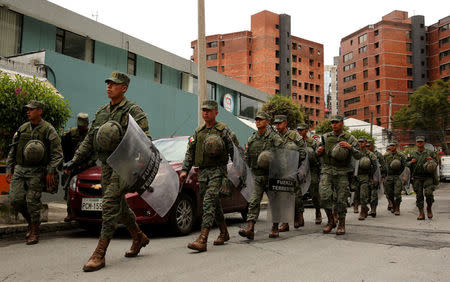Venezuela crisis casts shadow over Ecuador presidential election
By Alexandra Ulmer and Alexandra Valencia QUITO (Reuters) - Venezuela's political crisis is looming over Sunday's tight presidential election in Ecuador, where a leftist government aligned with Venezuela's socialist President Nicolas Maduro is hoping to prolong its decade-long rule. Ecuador pro-business candidate Guillermo Lasso has doubled down on accusations that government-backed candidate Lenin Moreno would turn the Andean country into Venezuela, alluding to a recent Supreme Court move there to neuter the National Assembly that foes denounced as a lurch into dictatorship. "A coup annulling the National Assembly! Is that what you want?" right-wing challenger Lasso told a crowd of supporters at a rally in the sweltering city of Guayaquil this week. "Then let's go for change! Change is avoiding Venezuela's suffering." The outgoing administration of Ecuadorean President Rafael Correa has scoffed at the accusations, slamming them as desperate attempts by Lasso, a former banker, to spook voters and cover up his plans to slash welfare programs. "They've been trying to confuse the population with the argument that Ecuador is going to turn into Venezuela," Foreign Minister Guillaume Long said on Friday. "But no, Ecuador is not Venezuela." The Ecuadorean economy, like the Venezuelan, is heavily dependent on oil and is suffering a downturn. But Ecuador's situation is a far cry from the full-blown crisis in Venezuela, where millions of people are suffering food shortages and raging inflation. Critics have long accused Correa of clamping down on the press, stacking institutions with supporters and being hostile toward business - just as they see happening in Venezuela's self-styled "21st century Socialism." Lasso accused "foreign mercenaries" - and alluded to them being Venezuelan - of trying to attack him with rocks, sticks, and knives after a soccer game on Tuesday. The Ecuadorean government rejected the accusation. The Venezuela crisis could be relevant given the tightness of Ecuador's election, with Moreno just slightly ahead in recent polls. The vote is being closely watched as South America has in recent months swung to the right, as a once solid leftist bloc loses ground amid an ebbing commodities boom and growing corruption accusations. UNDECIDED VOTERS With Latin American news dominated by the Venezuelan crisis and regional groups issuing statements condemning the Supreme Court move, Venezuela's turmoil is ever present in Ecuador. "Maduro is pushing that country to the limits. It's a dictatorship," said Felipe Kulqui Murillo, 65, an artisan who used to support Correa but will vote Lasso on Sunday. "Ecuador can turn into a second Venezuela. Correa and the Latin American presidents have promoted a hypocritical Socialism," he said in Guayaquil. In an interview with Reuters in February, Lasso said Correa "wants to leave his own Maduro in Ecuador," alluding to late leader Hugo Chavez asking Venezuelans to support Maduro, a former bus driver and union leader. Still, the economy is the top voter concern in Ecuador and a foreign crisis is unlikely to significantly change voters' minds. "There's a small group of undecided voters who could be impacted by what is happening in Venezuela," said Blasco Penaherrera of Ecuador-based pollster Market. Lasso voters are likely to dislike Maduro anyway while many leftists blame the Venezuela crisis on a power-hungry business elite seeking to sabotage socialism in Latin America. The Venezuelan crisis appears to be diffusing, too, with the pro-government Supreme Court on Saturday revoking its controversial annulment of the opposition-led Congress amid international condemnation and protests. Still, if Lasso becomes president he has said that he would vote to suspend Venezuela from the Organization of American States, if a proposed vote goes ahead, unless Maduro agrees to move up elections. But even some government supporters want a firmer stance against Maduro. "The situation there is severe," said technician Cristian Gomez, 44, who supports the government. "I don't like the relationship they have with Maduro. I think they should stop supporting him so much and worry about what's happening here." (Additional reporting by Yury Garcia in Guayaquil; Writing by Alexandra Ulmer; Editing by Bill Trott and Mary Milliken)
